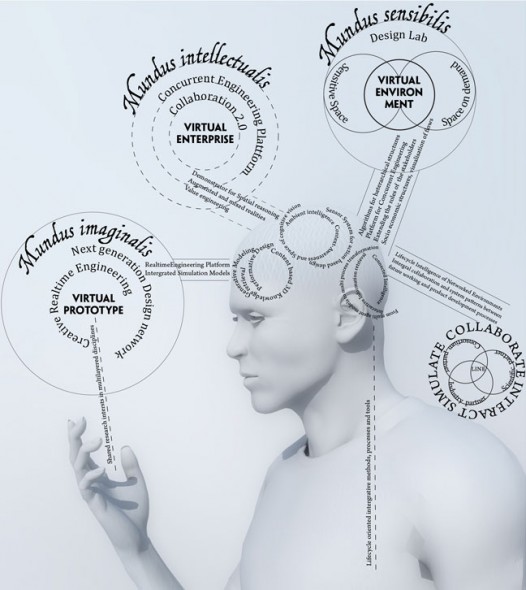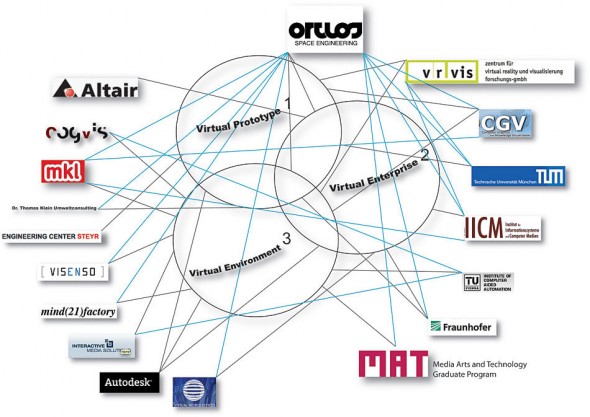As a high-tech SME, ORTLOS Space Engineering and its partner network have successfully managed to realize following the research projects, being in charge of all phases starting from the first ideas and concepts, up to the development and realization of the projects, as well the fund-rising on a local, national and EC level.
Project: A.N.D.I. Funding bodies: EC IST Program 5th Call, Stadt Graz Kultur, BKA Kunst Bundeskanzleramt, Land Steiermark
- 2002–2004 A.N.D.I. – A New Digital Instrument for networked creative collaboration. A.N.D.I. is an open source software development project dedicated to providing a web based platform of highly integrated tools for creative trans-disciplinary collaboration. It has two basic aspects. On the one hand it is a database driven collaborative environment and on the other hand it will enable the development of future software and tools for networked creative collaboration.
Project: City Upgrade / City Lab. Funding bodies: Forum Stadtpark, Stadt Graz Kulturamt, KulturKontaktAustria, Steirischer Herbst, Zukunftsfond Land Steiermark, Kulturabteilung Land Steiermark, BKA Kunst Bundeskanzleramt, Stadt Graz Wirtschaft und Tourismus, Kammer für Architekten
- 2005-2007 City Upgrade – The High-spirited Networked City. The aim is to make middle-sized European cities better adaptable to the challenges of the 21st century – the century characterized by difference, ambivalence and extreme openness – and, in doing so, secure their future in the future. The result should be a prototype of a networked city that works as an open, self-regulative, continuously renewable system offering its citizens a high-performance infrastructure.
- 2007-2009 City Lab iVAN – Intelligent Vibrant Ambience Network, City Lab – a mixed reality-based space module – is an instrument for creative networked collaboration, designed for world-wide usage. This modular environment is flexible due to an implemented innovative technology and a novel workflow. Enriched by mobile and virtual elements a broad spectrum of spatial settings is possible. The aim of the City Lab project is the development and realization of a radical vision of the new city lab for knowledge workers. The raw material predominantly processed and re-processed in this lab is information. This flexibility will make possible: a) the dislocated user can quickly and seamlessly continue work at a new location and b) “on-demand” working environments to be created according to any given requirement.
Project: GANDIS. Funding bodies: FFG, SFG, in-kind
- 2009-2010 GANDIS – Apple iPhone application supports energy-efficient planning of buildings. With the help of interactive 3D models that encourage playful experimentation GANDIS enables users to find out how various parameters affect the energy efficiency of a building and thus makes sustainable design easier from an early stage. The application includes reference models and explanations of the most important concepts.
Project: Sensitive Space. Funding bodies: BMUKK, Kultur, Kunsthaus Mürz, IEM KUGraz, FFG, Joanneum Graz, Kulturkontakt Austria
- 2010-2011 Sensitive Space – “Sensitive Space” is an audio-visual environment build upon the interaction among the users. It has to be distinguished that here human-human interaction is important, and not, as we are normally used in technological environments, human-computer interaction. The space is sensitive to the behavior of the users (agents) and the events are triggered thereafter.
Project: Responsive Open Space. Funding bodies: BMUKK, Kultur, Stadt Graz – Abteilung Kultur, Dom im Berg, FFG, Joanneum Graz
- 2011-2012 Responsive Open Space – Responsive Open Space (ROS) is a performative spatial environment integrating audio-visual compositions responsive to the engagement of participants among themselves. An artistic environment explores the limits of human interaction in creating a spatial setting for the musical performance. This setting is utterly based on information gathered by the tracking system of the users: their position, their movement and their relationship. The idea is a constant redefining of the virtual space for the performance by using the “relational feedback” for the triggering of the compositional parts.

